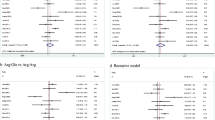Abstract
The X-ray repair cross-complementing group 3 (XRCC3) gene has been suggested to play an important role in the pathogenesis of hepatocellular carcinoma (HCC). However, the results have been inconsistent. In this study, we performed a meta-analysis to clarify the association of XRCC3 Thr241Met variant with HCC. The published literature from PubMed, Chinese National Knowledge Infrastructure, and Wan Fang data was retrieved. Pooled odds ratio (OR) with 95 % confidence interval (CI) was calculated using fixed or random effects model. A total of five studies (1,531 HCC cancer cases and 1,952 controls) for XRCC3 Thr241Met variant were included in the meta-analysis. The meta-analysis showed that XRCC3 Thr241Met variant was associated with HCC risk under homogeneous codominant model (OR = 3.99, 95 % CI = 1.74–9.13) and recessive model (OR = 5.22, 95 % CI = 3.65–7.48), but not under heterogeneous codominant model (OR = 1.18, 95 % CI = 0.68–2.05) and dominant model (OR = 1.37, 95 % CI = 0.73–2.57). Subgroup analysis by ethnicity suggested that XRCC3 Thr241Met variant was associated with HCC risk in Chinese population, but not in Pakistani population. The present meta-analysis supported the positive association of XRCC3 Thr241Met variant with HCC in the Chinese. Further large-scale studies with the consideration for gene–gene/gene–environment interactions should be conducted to investigate the association.





Similar content being viewed by others
References
Parikh S, Hyman D. Hepatocellular cancer: a guide for the internist. Am J Med. 2007;120:194–202.
Ferlay J, Shin HR, Bray F, Forman D, Mathers C, Parkin DM. Estimates of worldwide burden of cancer in 2008: GLOBOCAN 2008. Int J Cancer. 2010;127:2893–917.
Berwick M, Vineis P. Markers of DNA repair and susceptibility to cancer in humans: an epidemiologic review. J Natl Cancer Inst. 2000;92:874–97.
Miller MC, Mohrenweiser HW, Bell DA. Genetic variability in susceptibility and response to toxicants. Toxicol Lett. 2001;120:269–80.
Zipprich J, Terry MB, Brandt-Rauf P, Freyer GA, Liao Y, Agrawal M, et al. XRCC1 polymorphisms and breast cancer risk from the New York site of the Breast Cancer Family Registry: a family-based case–control study. J Carcinog. 2010;9:4.
Xu L. Association between polymorphism of DNA repair genes and hepatocellular carcinoma susceptibility: a case–control study. Master's dissertation of Fudan University; 2003. 1–42. Chinese.
Long XD, Ma Y, de Qu Y, Liu YG, Huang ZQ, Huang YZ, et al. The polymorphism of XRCC3 codon 241 and AFB1-related hepatocellular carcinoma in Guangxi population, China. Ann Epidemiol. 2008;18:572–8.
Liu W. The relation between genetic polymorphism of DNA repair gene XRCC3, XRCC4 and susceptibility to primary hepatocellular carcinoma. Master's dissertation of Fujian Medical University. 1–56. Chinese.
Han X, Xing Q, Li Y, Sun J, Ji H, Huazheng P, Jun L. Study on the DNA repair genes XRCC1 and XRCC3 polymorphisms in prediction and prognosis of hepatocellular carcinoma risk. Hepatogastroenterology. 2012;59 (119): doi:10.5754/hge12096.
Zeng X, Liu S, Yu H, Ji L, Li L, Huang J, et al. DNA repair capacity, DNA-strand break repair gene polymorphisms, and the incidence of hepatocellular carcinoma in southwestern Guangxi of China. DNA Cell Biol. 2012;31:1384–91.
Gulnaz A, Sayyed AH, Amin F, Khan A, Aslam MA, Shaikh RS, et al. Association of XRCC1, XRCC3, and XPD genetic polymorphism with an increased risk of hepatocellular carcinoma because of the hepatitis B and C virus. Eur J Gastroenterol Hepatol. 2013;25:166–79.
DerSimonian R, Laird N. Meta-analysis in clinical trials. Control Clin Trials. 1986;7:177–88.
Mantel N, Haenszel W. Statistical aspects of the analysis of data from retrospective studies of disease. J Natl Cancer Inst. 1959;22:719–48.
Long XD, Ma Y, Deng ZL, Huang YZ, Wei NB. Association of the Thr241Met polymorphism of DNA repair gene XRCC3 with genetic susceptibility to AFB1-related hepatocellular carcinoma in Guangxi population. Chin J Med Genet. 2008;25:268–71. Chinese.
Xu YH, Gu LP, Sun YJ, Cheng BJ, Lu S. No significant association between the XRCC3 Thr241Met polymorphism and lung cancer risk: a meta-analysis. Tumour Biol. 2013;34(2):865–74.
Liu L, Miao L, Ji G, Qiang F, Liu Z, Fan Z. Association between XRCC1 and XRCC3 polymorphisms and colorectal cancer risk: a meta-analysis of 23 case–control studies. Mol Biol Rep. 2012. doi:10.1007/s11033-012-2471-5.
Yin QH, Liu C, Li L, Zu XY, Wang YJ. Association between the XRCC3 T241M polymorphism and head and neck cancer susceptibility: a meta-analysis of case–control studies. Asian Pac J Cancer Prev. 2012;13:5201–5.
He XF, Wei W, Su J, Yang ZX, Liu Y, Zhang Y, et al. Association between the XRCC3 polymorphisms and breast cancer risk: meta-analysis based on case–control studies. Mol Biol Rep. 2012;39:5125–34.
Li F, Li C, Jiang Z, Ma N, Gao X. XRCC3 T241M polymorphism and bladder cancer risk: a meta-analysis. Urology. 2011;77:511.e1–5.
Fang F, Wang J, Yao L, Yu XJ, Yu L, Yu L. Relationship between XRCC3 T241M polymorphism and gastric cancer risk: a meta-analysis. Med Oncol. 2011;28:999–1003.
Acknowledgments
The work was funded by Zhejiang Medicine, Health, and Science (no. 2010KYB127), Zhejiang Province Chinese Medicine Research Program (2012ZA130), and Zhejiang Gong Yi Xing Technology Application Project (2012C33025).
Conflicts of interest
None.
Author information
Authors and Affiliations
Corresponding author
Additional information
The Publisher and Editor retract this article in accordance with the recommendations of the Committee on Publication Ethics (COPE). After a thorough investigation we have strong reason to believe that the peer review process was compromised.
An erratum to this article can be found online at http://dx.doi.org/10.1007/s13277-017-5487-6.
An erratum to this article is available at http://dx.doi.org/10.1007/s13277-017-5487-6.
About this article
Cite this article
Liu, C., Wang, H. RETRACTED ARTICLE: XRCC3 T241M polymorphism is associated risk of hepatocellular carcinoma in the Chinese. Tumor Biol. 34, 2249–2254 (2013). https://doi.org/10.1007/s13277-013-0765-4
Received:
Accepted:
Published:
Issue Date:
DOI: https://doi.org/10.1007/s13277-013-0765-4




